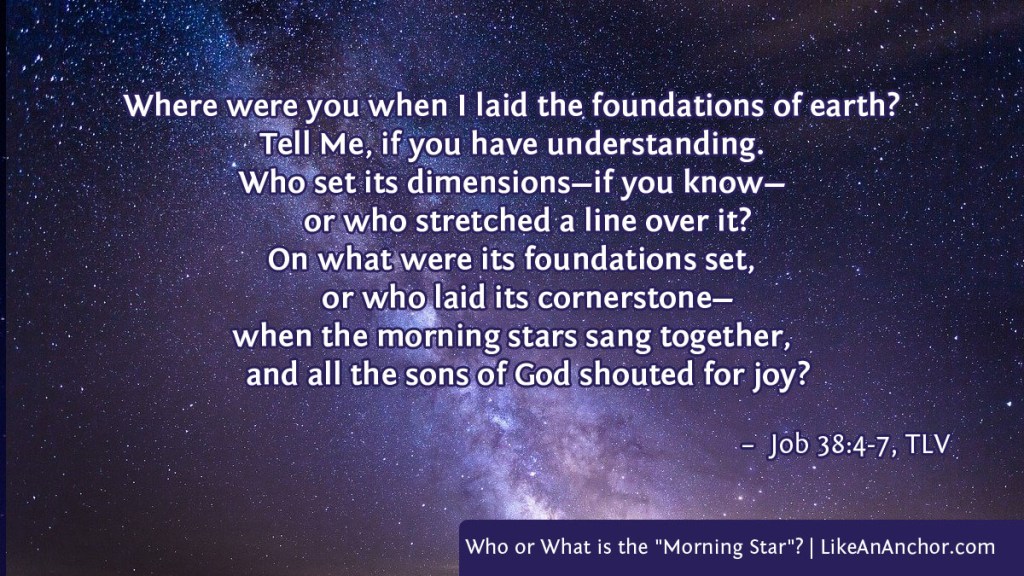A comment on last week’s post about names got me thinking about “Morning Star” as a title for Jesus Christ. Many of His titles are easy to interpret. They make a lot of sense–of course He’s called Savior, Redeemer, Lord, High Priest, and Lamb of God. We have tons of evidence for and explanations of those titles and roles. In contrast, Morning Star isn’t quite so easy to define.
I’ve studied Jesus as the Light before, and touched on the Morning Star title in those posts (see “The Sun of Righteousness” and “The Light From The Beginning“). I haven’t dug deep into this particular title, though, or addressed the fact that there’s also a verse describing Satan as a “morning star” (though that depends on which translation you’re using).
The phrase “morning star” is used infrequently through the Bible, and not always of Jesus. To understand how this title is used, we need to understand how the Bible talks about stars and which Old Testament passages inform the New Testament verses saying Jesus is the Morning Star. As we’ll see, this title has to do with Jesus’s authority, His light, and His role understanding God’s ways.
Morning Stars in the Bible
“Morning Star” isn’t only used as a title for Jesus. The words show up in other verses as well, and looking at those can help give us a feel for what Morning Star means when used as a title. Let’s start with looking at the Hebrew words in the Old Testament.
In the story of Job, God shows up in-person to answer Job’s questions with some questions of His own. He asked, “Where were you when I laid the foundations of the earth? … Or who laid its cornerstone, when the morning stars sang together, and all the sons of God shouted for joy?” (Job 38:4, 6-7, WEB). This verse uses the Hebrew words kokab (H3556, “star”) and boqer (H1242, “morning, break of day”) (definitions from BDB lexicon). It’s the only time in the Bible those two words are used together. There’s other talk of stars in the Bible–both literal stars and as figurative language for spiritual beings–but this is the only place in the Old Testament that really narrows in on the idea of “morning stars.”
Other phrases translated “morning star” in English versions of the Old Testament use different words. When Job “cursed the day he was born” and said “Let its morning stars be darkened” (Job. 3:1, 8, NET) the Hebrew word translated “morning” more often means “twilight” (though it can be evening or morning twilight, H5399). It’s not the same phrase as God uses later in Job 38:7. Similarly, the verse in Isaiah talking about Satan’s fall is sometimes translated “morning star, son of the dawn” (Is. 14:12, NIV). However, a more accurate translation of heylele (H1966) would be “shining one.”
How you have fallen from heaven, shining one, son of the dawn! How you are cut down to the ground, who laid the nations low! You said in your heart, “I will ascend into heaven! I will exalt my throne above the stars of God! I will sit on the mountain of assembly, in the far north! will ascend above the heights of the clouds! I will make myself like the Most High!” Yet you shall be brought down to Sheol, to the depths of the pit.
Isaiah 14:12-15, WEB
This passage is talking about one who shone like the dawn and arrogantly thought he could exalt himself “above the stars of God” (that word in v. 13 is kokab). I don’t want to spend too much time on this point, but the question “Aren’t Jesus and Satan both referred to as the morning star?” does come up from time to time and can be confusing. Though the titles may have some similarities, the comparison highlights the differences between these two beings. Just like Jesus as the Lion of Judah is far more powerful than Satan as a roaring, ravenous lion, so does Jesus as the Morning Star and Light of the World outshine Satan’s former glory as a shining one.

The Star of Jacob
The clearest connection between an Old Testament prophecy and Jesus as the Morning Star comes from a section of scripture that doesn’t include the word “morning.” This prophecy was delivered by Balaam, a prophet hired by Balak, king of Moab, to curse the nation of Israel. God did not permit him to speak curses over them, though; he was only allowed to speak blessings (Num. 22-24).
“Balaam the son of Beor says,
Numbers 24:15-19, WEB (emphasis added)
the man whose eyes are open says;
he says, who hears the words of God,
knows the knowledge of the Most High,
and who sees the vision of the Almighty,
falling down, and having his eyes open:
I see him, but not now.
I see him, but not near.
A star will come out of Jacob.
A scepter will rise out of Israel,
and shall strike through the corners of Moab,
and crush all the sons of Sheth.
Edom shall be a possession.
Seir, his enemy, also shall be a possession,
while Israel does valiantly.
Out of Jacob shall one have dominion,
and shall destroy the remnant from the city.”
This is the only Old Testament passage I’ve found that explicitly identifies the promised Messiah as a star. That being the case, this prophecy is likely something Peter was thinking of when he wrote these words:
For he received honor and glory from God the Father, when that voice was conveyed to him by the Majestic Glory: “This is my dear Son, in whom I am delighted.” When this voice was conveyed from heaven, we ourselves heard it, for we were with him on the holy mountain. Moreover, we possess the prophetic word as an altogether reliable thing. You do well if you pay attention to this as you would to a light shining in a murky place, until the day dawns and the morning star rises in your hearts.
2 Peter 1:17-19, NET
Here in these verses, Peter chooses not to use the standard Greek word for star (aster, G792). Rather, he uses the word phosphorous , which means “light bringing” (G5459). The reason that it’s translated “morning star” is because it’s often used of the planet Venus as the “day star” (Thayer’s dictionary). It is also is “a Hellenistic word that was sometimes used of emperors and deities” (NET footnote). This strengthens the connection back to Numbers 24:17 by connecting to the authority Jesus has as the scepter-carrying Star of Jacob. 17
What Peter’s doing here is connecting his audience back to prophecies in the Old Testament scriptures that point to Jesus as the Messiah, then he references one of those prophecies while drawing a parallel between Jesus as the Morning Star and Light that shines into our minds. That connection is made even more explicit through Jesus’s own words at the end of Revelation (though He uses aster) .
“I, Jesus, have sent my angel to testify these things to you for the assemblies. I am the root and the offspring of David, the Bright and Morning Star.”
Revelation 22:16, WEB
The Morning Star Dawns in Us

If we look back at the verse in Peter’s letter, we see he’s talking about how the Bible (specifically the “prophetic word”) is something we ought to “pay attention to … as you would to a light shining in a murky place, until the day dawns and the morning star rises in your hearts.” There’s a connection between Jesus’s title Morning Star and the way that truths of His word dawn on us. He is the great light shining into the world’s darkness; “the dawn from on high” who visited us (Matt. 4:13-16; Luke 1:76-79).
Even if our Good News is veiled, it is veiled in those who are dying, in whom the god of this world has blinded the minds of the unbelieving, that the light of the Good News of the glory of Christ, who is the image of God, should not dawn on them. For we don’t preach ourselves, but Christ Jesus as Lord, and ourselves as your servants for Jesus’ sake, seeing it is God who said, “Light will shine out of darkness,” who has shone in our hearts to give the light of the knowledge of the glory of God in the face of Jesus Christ.
2 Corinthians 4:3-6, WEB
From the Old Covenant times until now, the righteous have been associated with light, dawn, and the sun (Ps. 112:3-5; Prov. 4:17-19; Is. 62:1; Dan. 12:2-3; Matt. 13:43). God is light, and if we walk in His ways (i.e. live righteously) then we will shine with His light (1 John 1:5-7). It’s because of Jesus shining into us that we have the chance to shine with God’s righteousness. This idea of Jesus dawning understanding into us may be why His letter to the church at Thyatira says this:
He who overcomes, and he who keeps my works to the end, to him I will give authority over the nations. He will rule them with a rod of iron, shattering them like clay pots; as I also have received of my Father: and I will give him the morning star. He who has an ear, let him hear what the Spirit says to the assemblies.
Revelation 2:26-29, WEB
It’s sort of a weird phrase. Based on what we’ve studied on this topic, Jesus giving people “the morning star” may be connected to understanding, righteousness, and/or authority. It’s hard to tell for sure, though. Like so many things in the Bible, “morning star” is something we could study over and over again, and probably find a deeper understanding each time. I’m not sure where we might take this study next, but I feel it’s still at the beginning stages. Who knows, maybe we’ll come back to it again in another two years (that’s about how long it’s been since the last post I wrote which touched on the Morning Star).
If you have thoughts on this study or it inspires you to dig into the topic of stars in the Bible, let me know in the comments. I’d love to hear what you think and learn about this!
–
Featured image by Bruno /Germany from Pixabay
Song Recommendation: “Let There Be Light” by Josh Wilson



I didn’t realize there were so many layers to this. To be honest, I didn’t know there were other names of God/Jesus until several years ago–Morning Star was one that stuck out to me. I took it at face value, as a light appearing in the darkest of darks. I forgot that Lucifer was referred to as a falling star just now (even though I put it in my most recent book, good grief). But I didn’t know he was referred to as a morning star as well. The juxtaposition of their titles appear more than coincidental to me (lion, stars, etc.). Just lots of things to chew on. Looking forward to reading more. Take care.
LikeLiked by 1 person
In the Authorized Version 1611, Jesus is called the morning star. Lucifer is called the son of the morning. The verse from Job describes angelic (created) beings singing. John 1;1-3 gives a very succinct description of who Jesus is. Everything about Satan is counterfeit, he wants to be ‘like’ The Most High.
LikeLiked by 1 person
“Counterfeit” is a good word for it. I didn’t think of this verse until a couple days after writing this post, but “Satan masquerades as an angel of light” (2 Cor. 1:14, WEB) would also fit well into this study.
LikeLike